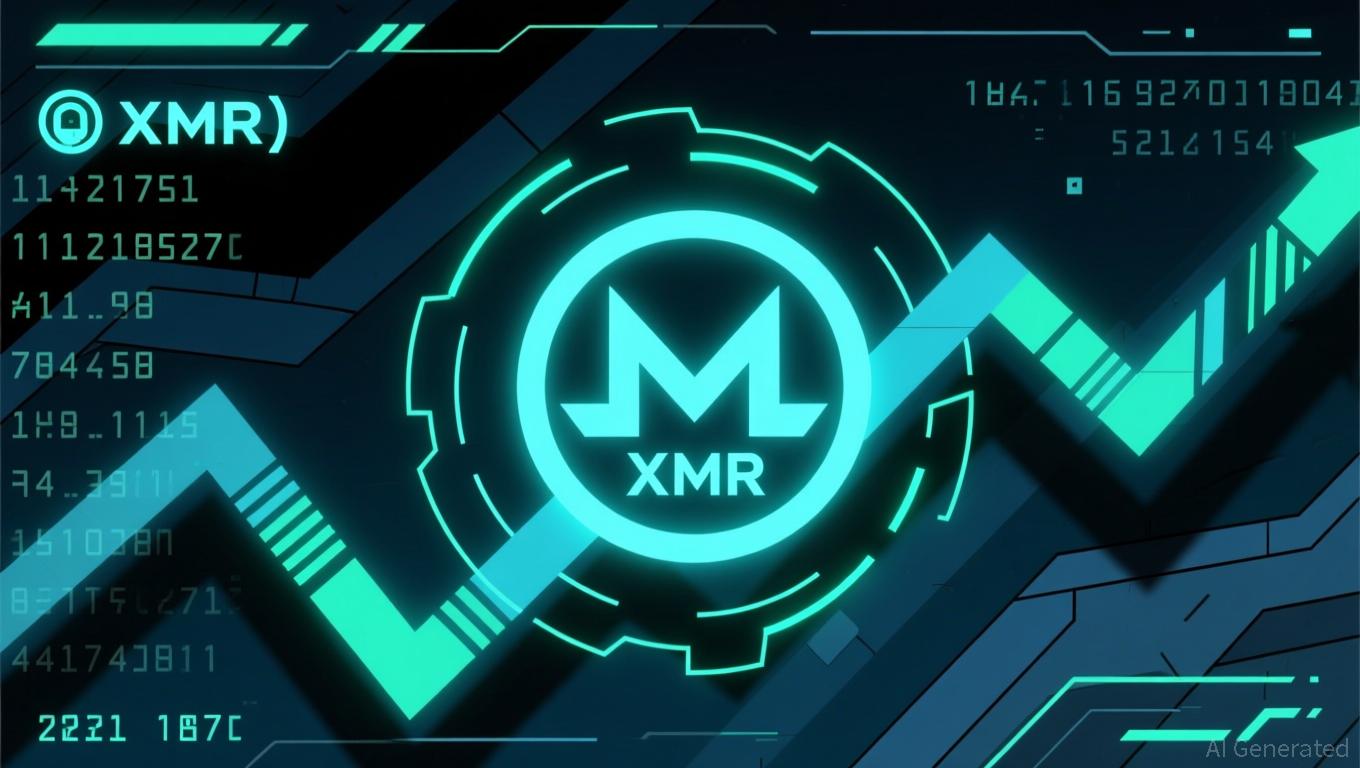Monero’s reputation for privacy faces challenges from modular competitors and evolving regulations
- Monero (XMR) nears $400 as privacy-focused crypto gains traction amid evolving market demands for modular solutions. - Emerging rivals like Solana's GhostwareOS and Zcash challenge Monero's dominance with interoperable privacy features. - Regulatory pressures, including South Korea's expanded AML rules, heighten scrutiny on privacy coins despite their anti-surveillance design. - Analysts highlight Monero's "extreme privacy" legacy but note growing adoption of integrated privacy tools in active blockchain
Monero's Upward Momentum and the Changing Privacy Crypto Landscape
Monero (XMR) has continued its recent upward trend, with bullish investors setting their sights on a possible new yearly high. As the privacy-centric cryptocurrency trades in the $380 to $390 range, its market capitalization stands at roughly $6.9 to $7.0 billion, based on Binance figures.

Experts in technical analysis highlight Monero’s enduring reputation as a leader in privacy, thanks to features like ring signatures and stealth addresses. However, the broader crypto sector is increasingly gravitating toward modular privacy tools that can be integrated into various blockchain platforms.
Innovation and Competition in Privacy Coins
The resurgence of interest in privacy coins is fueled by both technological progress and shifting regulatory frameworks. While Monero’s robust anonymity remains a key advantage, it now faces competition from emerging projects such as GhostwareOS on Solana, which introduces privacy layers compatible with DeFi and NFT applications.
Meanwhile, Zcash (ZEC) has established itself as a top contender in 2025, trading close to $500 and serving as a cornerstone for on-chain privacy. Ghost, another privacy-oriented project, is gaining momentum with its GhostPay service, which anonymizes transactions and redistributes fees to token holders, even though its market cap is comparatively modest.
Market Trends and Institutional Interest
The overall cryptocurrency market has shown signs of stabilization. Notably, XRP experienced a 7% jump following the introduction of regulated ETFs, signaling a rise in institutional participation. Despite these developments, Monero’s path is shaped by its distinct position within the privacy sector. Analysts point out that while Monero remains the “gold standard” for default privacy, its significance is now complemented by privacy solutions that are seamlessly woven into broader blockchain ecosystems. This evolution reflects a maturing market that values both privacy and interoperability.
Regulatory Developments and Their Impact
Regulatory scrutiny continues to intensify around privacy-focused assets. For example, South Korea has recently broadened its anti-money laundering (AML) regulations to include crypto transfers below $680, increasing oversight of privacy coins. These measures are designed to close gaps that could be exploited for illegal activities such as drug trafficking and tax evasion. Although Monero’s technology is inherently resistant to such controls, the evolving regulatory landscape may influence investor confidence and adoption strategies.
Outlook for Monero
Looking forward, Monero’s ability to sustain its price rally will hinge on how well it balances its core privacy features with the changing needs of the market. Technical signals, such as resistance points and trading volume, indicate the possibility of a breakout if institutional interest remains strong. Nevertheless, larger economic factors—including interest rate trends and geopolitical events—will also have a significant impact on Monero’s future performance.
Disclaimer: The content of this article solely reflects the author's opinion and does not represent the platform in any capacity. This article is not intended to serve as a reference for making investment decisions.
You may also like
Cardano News Update: Cardano Bets $70M in ADA—Will Infrastructure Improvements Drive Expansion?
- Cardano's stakeholders seek 70M ADA from Treasury to fund 2026 growth via infrastructure upgrades, led by IOG, EMURGO, and key foundations. - Proposed upgrades focus on stablecoin integration, cross-chain bridges, and institutional tools to attract capital and scale DeFi, addressing TVL stagnation at $190M. - Milestone-based funding aims to ensure accountability, aligning with institutional demands for secure custody and analytics while avoiding speculative ventures. - Market analysis shows cautious opti

Tech's $96B Bet on AI: Borrowing Spree Could Spark Another Bubble
- Tech sector's AI debt surged to $96B as firms like OpenAI, Oracle , and CoreWeave secure massive loans to expand infrastructure. - Oracle's 9.17% stock drop highlights risks of overreliance on OpenAI, with DA Davidson cutting its price target due to "fake it 'till you make it" concerns. - CoreWeave's $7.5B credit facility and tripled interest costs mirror 2008 crisis-era CDO risks, raising sustainability questions for AI-driven growth. - xAI's $15B funding round and OpenAI's $40B private raise underscore

Philanthropist MacKenzie Scott Tackles Educational Disparities Using a Blended Loan Approach
- Philanthropist MacKenzie Scott invests in Funding U, a startup offering merit-based student loans without co-signers, inspired by her own $1,000 college loan. - The hybrid model combines Scott's "junior debt" with bank funding, using algorithms to assess academic potential rather than credit scores. - This approach targets low-income students, blending philanthropy with market incentives to address educational inequity and systemic barriers. - The investment reflects growing trends in impact investing, w
Tokenized Stocks Gain Momentum as Crypto Meets TradFi